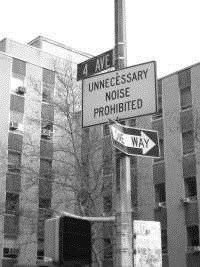
In its last meeting of 2005, the New York City Council enacted legislation to make the city a quieter, cleaner and more environmentally-friendly place to live. Perhaps one of the major initiatives sought by the mayor’s office was revising the city’s 30-year old noise code. Honking horns, noisy refuse trucks, construction clamor, boom boxes and car alarms are just some of the undeniable facts of life in living in the city that never sleeps. However, residents may sleep a little quieter when that outdoor noise, music and even barking dogs are muzzled by new restrictions that carry fines ranging from $50 to $8,000 depending on the nature of the offense.
Stamping Out Noise
Without question, noise is the number one complaint fielded by operators at the city’s Citizen Service Center 311 hotline, according to mayoral spokesman Jonathan Werbell.
In 1972, New York City became one of the first cities in the nation to adopt a comprehensive noise code. Mayor Michael R. Bloomberg, who is beginning his second term, has made noise reduction a major campaign initiative. In October 2003, he began Operation Silent Night, a program that calls on the New York City Department of Environmental Protection (DEP), the New York Police Department (NYPD) and other city agencies to target noise problems in 24 different enforcement zones throughout the city.
Based on over 300,000 noise complaints logged, according to the Mayor’s Management Report for Fiscal Year 2005, the DEP issued 1,566 noise violations while the NYPD issued 19,234 unreasonable noise summonses during the fiscal year.
Noise complaints range from the cacophony emanating from bars, nightclubs or restaurants to blaring horns from cars or motorcycles, music from home or personal entertainment systems or automobile sound systems, or just loud or disorderly individuals. Enforcement measures are varied depending on conditions observed, according to the mayor.
“Noise complaints continue to be the number one quality of life issue for New York City residents. In fiscal year 2005, the city’s 311 hotline logged over 335,000 noise complaints. Unfortunately, the city’s noise code is over 30 years old and is archaic and out of date,” said the mayor at the formal bill signing ceremony for Intro 397-A.
“The new code will make New York a quieter place to live and work by decreasing excessive and annoying noise. The new code will specifically decrease noise from construction sites, motorcycles, ‘boom cars,’ air conditioners and nightclubs by strengthening standards and implementing commonsense solutions,” Bloomberg said. “This legislation has been a collaboration between the city, the construction and nightlife industries, neighborhood groups and the City Council. I congratulate all the stakeholders for their hard work. Today’s legislation protects New York’s legacy as the ‘city that never sleeps’ while making sure that hard working New Yorkers can get some peace and quiet.”
The long-awaited version of the bill, which drew some controversy because of its ban on music emanating from Mr. Softee ice cream trucks, now allows the trucks to only play music while in motion. Other restrictions are a prohibition of excessive noise from construction sites and a limit on construction work after hours and on weekends. Construction work would not be allowed between 7 a.m. and 6 p.m. on weekends, and after hours on weekdays, unless a permit for such work is issued by an authorizing city agency. Additionally, sanitation and other large commercial trucks would be forbidden from operating in residential areas at night.
Decibel levels at bars and nightclubs also would be minimized. Bars and nightclubs would be required to keep noise below a level of 42 decibels instead of the current standard of 45 decibels, when measured from a nearby residence. Enforcement would have to be validated by police use of a noise meter to measure the offending sounds.
Normal conversation is measured to be approximately 65 decibels. The National Institute of Occupational Safety and Health says prolonged exposure to levels over 85 decibels can be harmful.
Loud noise created by motorcycles, car radios and portable stereos is also verboten under the revised code. And don’t forget about Fifi or Fido. Continuous animal noise inside a residence for more than 10 minutes between the hours of 7 a.m. and 10 p.m. or for more than 5 minutes after 10 p.m. would be prohibited and subject to enforcement. Fees for a first violation range from $50 for using a cell phone in a public performance place while a performance is happening to $8,000 for violating the decibel level limits associated with commercial music. Subsequent violations of the same provision by an offender committed within two years carry stiffer penalties.
Tim Lannan, the president of Neighbors Against NOISE, a neighborhood group that was founded in 1996 by people who live and work in Tribeca to combat excessive noise and noxious emissions from nearby commercial buildings, supports the bill’s intent but not the final outcome. The group is presently concerned about excessive noise emanating from a telecommunications building there that uses large air conditioners and generators to help cool computers. “Basically, as written and approved by the City Council, I believe that the ‘new improved noise code’ is an incredibly watered down version of what was presented in January 2005 and will not make much of a difference, if any, at least in regards to building noise,” Lannan said.
Noise, says Greg Carlson, the executive director of the Federation of New York Housing Cooperatives & Condominiums (FNYHC), is a quality of life issue that most people will not argue against. The legislation will most affect nightclubs and restaurants, but one sticking point in the bill, probably will be enforcement, he says.
For things like barking dogs, loud stereos, and the like, the brunt of the enforcement will probably fall on multi-family buildings, owners and managers, he believes. “In most violations, in most of the agencies, it’s going to depend on who’s going to be enforcing this. It probably will be the purview of the Environmental Control Board, and that usually goes against the building. Most violations is not the individual, it’s usually the building — in a multi-family situation. There may be a negative side to this. It’s hard enough to control a lot of things in your building and now you have to control barking dogs and people with excess noise. They’re playing their stereo too loud. Noise complaints are the number one management issue.”
On the overall, “the aspect of the bill I think is good,” added Carlson. “But if they go and really enforce it to the letter of the law going down to internal things that happen in a co-op or condominium, I think they’re stretching it too much and I think that could pose a problem.”
A magazine study earlier this year found that Upper West Side traffic can reach 79 decibels, while the Astor Place subway came in at an ear-screeching 101 decibels. A car horn in Midtown measures upwards of 90 to 101 decibels. And don’t forget about the canine population. A barking dog — one of the most common complaints to the city’s 311 hotline — can reach 100 decibels or more. Construction drilling in the street measures 90 decibels (sometimes more), which is probably about the same level as the aerobics class in your local gym. The new code will take effect in July 2007.
Clean and Green
Another quality of life issue advocated by the mayor is promoting a cleaner New York. The City Council passed and the mayor also signed into law Intro 299-A, which is aimed at curbing the spread of graffiti on buildings, streets and sidewalks. The bill establishes penalties for certain commercial and residential building owners who fail to remove graffiti from their buildings, and grants the city the right to clean graffiti from commercial and residential buildings. The legislation states that graffiti is more than just an annoyance; it is a quality of life issue for all New Yorkers. “Graffiti creates an atmosphere of neglect, inviting criminal activity and contributing to a feeling of disorderliness and fear.”
A building left with untreated graffiti will be considered a public nuisance. Owners of commercial buildings or residential buildings (with six or more units) who fail to remove graffiti from their property can be fined between $150 and $300 if they do not respond within sixty days of receiving a notice.
Carlson says that this is another quality of life issue that makes good sense. If a building owner doesn’t come in and clean up the graffiti, the city will come in and do it, he says. “Again, how can you say that that’s a bad thing?” It will improve curb appeal in the neighborhood and enhance the building’s property value as well, he says.
Legislation was also passed to make city officials and city agencies more conscious about the environment. The council approved a package of legislation that will require the city to purchase and use “environmentally-friendly” products and cleaning solvents.
Put it in Writing
Another proposal under consideration by the City Council, which would affect co-op and condominium boards and their operations, concerns legislation to require written reasons for rejecting applicants for admission to a building.
The bill, entitled Intro 504, was discussed several months ago by the council’s Committee on General Welfare. The “Fair and Prompt Co-op Disclosure Law,” would amend New York City’s human rights law to require cooperative corporations to provide prompt, written notice of their reasons for rejecting applications to purchase shares. No action has been taken on the bill, which drew serious criticism from the co-op and condo community and real estate industry. Under present law, co-op and condo boards do not have to explain why an applicant was rejected.
New York City has the nation’s largest market for cooperative housing, and more than half of the city’s co-ops are located outside of Manhattan, according to Councilman Hiram Monserrate, D-21, of Queens, the bill’s chief architect. The bottom line for proposing Intro 504, he explains, is to bolster existing discrimination laws, which are difficult to regulate and enforce under current policy.
“The council finds that there has historically been and continues to be widespread resistance on the part of cooperative corporations to provide reasons when these corporations withhold consent to the sale of an apartment. This unwillingness to provide reasons has frequently served to conceal both arbitrary refusals to consent to sales and discriminatory refusals to consent to sales,” states the bill.
“The lack of any mechanism by which prospective purchasers can timely determine the reasons for a cooperative corporation’s withholding of consent has impaired their and the city’s ability to identify unlawful discriminatory practices, has facilitated the ability of cooperative corporations to craft in the context of actions or proceedings alleging unlawful discriminatory practices a variety of pretexts for having withheld consent and has deterred many New Yorkers from seeking homes in cooperative apartment buildings.”
The bill would make cooperative corporations provide detailed written statements specifying all reasons for withholding consent to a prospective purchaser within five business days after a decision to withhold consent has been made. And the officer of that cooperative corporation would have to certify those reasons as a statement of fact.
Standing in opposition were representatives of the Council of New York Cooperatives and Condominiums (CNYC), the Federation of New York Housing Cooperatives and Condominiums (FNYHC) and the Real Estate Board of New York (REBNY). The organizational triumverate all cited existing laws against discrimination and the possibility of a “chilling effect” in the cooperative marketplace as a result of the proposed legislation.
“The co-op movement has been around for 200 years, and the guiding force behind it is the principle that cooperatives are voluntary organizations open to all persons able to use their services and willing to accept responsibilities of membership, without discrimination,” said Carlson. Shareholders in cooperatives have obligations, he stated, and in the case of the significant number of entirely self-managed co-ops, Intro 504 would hamper sales and create an air of uncertainty throughout the city.
Marolyn Davenport of REBNY and Mary Ann Rothman of the CNYC, also cited a negative impact on the marketplace as well as the perceived detrimental effects the law could have on co-op boards. Shareholders, for example, may be discouraged from serving on volunteer boards and there could be substantial increases in litigation, which would be taxing on the operation of cooperatives, they said.
Although no action is expected on the bill immediately and it will likely be reintroduced, Carlson added that whomever becomes the new council speaker this month will have a lot to do with how the bill ultimately progresses in 2006.
Bridging the Digital Divide
In keeping with today’s ever-changing technology, Mayor Bloomberg sided with the council signing a bill December 29th that would examine providing broadband accessibility to all New York City residents. Council members voted to create a special commission to study the issue of providing Internet access. Hearings would be held in all five boroughs. Intro 625-A will advise the mayor and the council on how the resources of city government can be used to provide city residents and businesses with more options in terms of Internet access.
“New York City is one of the most wired cities in the United States, but we are falling behind our international competitors,” says Council Member Gale Brewer, D-6, who sponsored the bill and represents the Upper West Side and Clinton. “With other major U.S. cities, such as Philadelphia and San Francisco, looking to bring affordable broadband to all of its residents, New York City needs to have a very public discussion about the role of city government in ensuring that New York City has a robust telecommunications and technology infrastructure. Access to broadband and other technologies can bridge the digital divide in our schools and neighborhoods, while at the same time, promote economic opportunity and growth for residents, non-profits, and business.”
The committee will be required to hold two public hearings in every borough during its three years of existence. In addition, the committee will issue a report yearly with recommendations to the mayor and the council on how municipal government can accelerate the construction of broadband infrastructure throughout the city.
Update from Albany
At the state Capitol in Albany, it was a slow year for legislative initiatives related to housing. Several bills providing for Mitchell-Lama housing and tenant protections passed the Assembly but failed to gain approval in the Senate. All of them would need to be reintroduced in the 2006 session in order to be considered for passage, according to the state Assembly’s press office.
There is also a bill, originally proposed 10 years ago by Housing Committee Chairman and Assemblyman Vito Lopez, D-Brooklyn, related to a Condo Bill of Rights. The bill, still in committee but garnering support in the new session, would require condo and co-op boards to process requests for action quickly and without discrimination; hold elections by secret ballot and post results publicly; and fill vacancies in a timely fashion. It also would make financial statements available to all owners at least annually, including board members' financial interest in any company providing goods or services to the association. Aggrieved unit owners could appeal to the state Attorney General's Office to intervene when disputes arise.
The governor will present his State of the State address on January 4th to begin the new legislative session.
Debra A. Estock is managing editor, Liz Robbins, the associate publisher, and Kim Cameron, editorial assistant, of The Cooperator.






Leave a Comment